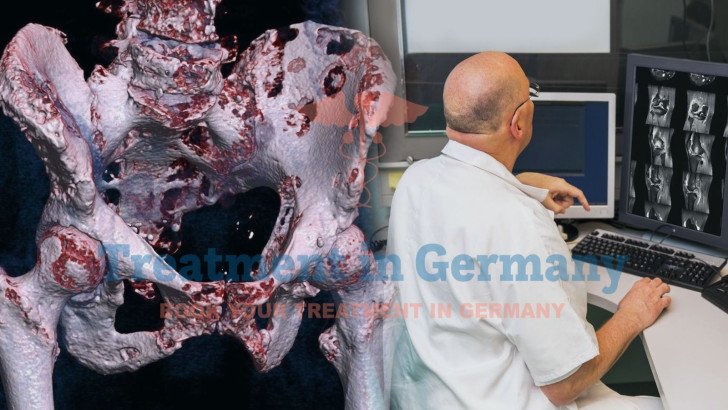
. The introduction of innovative approaches to cancer treatment is conducted at specialized clinics in the country with a high level of healthcare.
Bone metastases, where cancer spreads to the bones, pose significant challenges, causing pain, fractures, and reduced mobility. In Germany, cancer treatment offers advanced, multidisciplinary approaches to manage bone metastases, integrating targeted therapy, radiotherapy, immunotherapy, and dendritic cell therapy, delivered by expert doctors, including German oncologists and orthopedic specialists, in leading hospitals.
Bone metastases occur when primary cancers, such as breast, prostate, or lung cancer, spread to bones, most commonly the spine, pelvis, or femur. They affect up to 70% of advanced cancer patients, causing pain, fractures, and spinal cord compression. Risk factors include obesity, diabetes, high cholesterol (hyperlipidemia), and autoimmune diseases, which complicate management.
Germany’s approach focuses on pain relief, structural stability, and disease control, achieving a median survival of 6-48 months depending on the primary cancer. Hospitals use latest research in cancer treatment to deliver personalized cancer therapy, improving quality of life after treatment in Germany.
Diagnosing Bone Metastases in Germany
Accurate diagnosis is critical for effective bone metastases management. Doctors employ advanced tools to confirm metastasis, assess bone damage, and guide treatment.
German oncologists in DKG-certified hospitals provide rapid diagnoses, enabling prompt cancer treatments.
Treatment Options for Bone Metastases in Germany
Germany offers a comprehensive range of treatments for bone metastases, tailored to cancer type, metastatic extent, and patient health. Hospitals integrate cancer treatment options to optimize outcomes.
Systemic Therapies
Systemic treatments target both bone metastases and the primary cancer.
Radiotherapy
Radiotherapy relieves pain and stabilizes bones, with 60-80% of patients experiencing pain reduction.
Surgical Interventions
Surgery addresses structural complications or prevents fractures.
Bone-Modifying Agents
Bisphosphonates (e.g., zoledronic acid) and denosumab prevent skeletal-related events (SREs) like fractures or hypercalcemia, reducing SRE incidence by 30-50%. Doctors integrate these with systemic therapies.
Pain Management
Pain control is central to bone metastases management. Hospitals use opioids, nerve blocks, and palliative radiotherapy, alongside complementary therapies like acupuncture, to improve quality of life.
Clinical Trials and Emerging Therapies
Germany leads in innovative cancer treatments, offering trials for novel therapies like CAR T-cell therapy or combination immunotherapy for bone metastases. These trials, accessible in DKG-certified hospitals, advance cancer treatment options.
Why These Treatments Are Effective for Bone Metastases
Bone metastases require a multifaceted approach due to their impact on pain and mobility. Germany’s treatments succeed because:
Hospitals reduce pain in 70% of patients and extend survival in metastatic cases, per clinical data.
Benefits of Bone Metastases Treatment in Germany
Germany’s cancer treatment options in Germany offer significant advantages:
Side effcts, like fatigue or mild radiation discomfort, are managed by doctors, ensuring patient comfort.
Complementary Therapies Supporting Bone Metastases Treatment
Complementary therapies enhance outcomes:
These are standard in hospitals, ensuring holistic cancer therapy in Germany.
Why Germany Excels in Bone Metastases Treatment
Germany leads in cancer treatment due to:
Germany’s outcomes for bone metastases surpass EU averages by 5-10%, reflecting its expertise.
Conclusion
Bone metastases treatment integrates targeted therapy, radiotherapy, immunotherapy, dendritic cell therapy, and surgical interventions, tailored to patient needs. Delivered by expert German oncologists in DKG-certified hospitals, these cancer treatment options relieve pain, restore function, and enhance quality of life after treatment in Germany. With complementary therapies and trial access, Germany is a premier destination for bone metastases care.
🌍Why Patients Worldwide Prefer Our Medical Services in Germany – Key Benefits Explained:
FAQS
What are the best ways to diagnose bone metastases in Germany?
Advanced CT scans, MRI, PET-CT, and genetic testing confirm bone metastases and their extent.
What treatments are available for bone metastases in Germany?
Options include targeted therapy, immunotherapy, dendritic cell therapy, radiotherapy, and surgery.
How much does bone metastases treatment cost in Germany?
Costs vary based on treatment plan and individual needs; estimates can be requested from medical facilities.
Can bone metastases be cured with treatment in Germany?
While not typically curable, bone metastases treatments control disease and improve quality of life after treatment in Germany.
How effective are treatments for bone metastases in Germany?
Treatments effectively reduce pain and extend survival with targeted therapy and immunotherapy for bone metastases.
How experienced are German doctors with bone metastases?
German specialists are global experts in innovative cancer treatments for bone metastases management.
How long is the wait for bone metastases treatment in Germany?
Treatment typically starts within 1-2 weeks, ensuring prompt cancer therapy in Germany.
Are clinical trials available for bone metastases in Germany?
Yes, trials for innovative cancer treatments like dendritic cell therapy are available for eligible patients.
How does Germany’s bone metastases treatment compare to other countries?
Germany leads with advanced cancer treatment options and superior outcomes for bone metastases.
Can I get a treatment plan before traveling to Germany?
Yes, facilities can provide personalized bone metastases treatment plans based on medical records.
For more information or a free consultation, visit our contact us page.
Kindly complete the form below, and our dedicated team will reach out to you promptly. We look forward to connecting with you soon!
Trierer Straße, 56072 Koblenz, Germany

.webp)
 (1).webp)

.webp)
 (1).webp)


.webp)
 (1).webp)

.webp)
 (1).webp)
